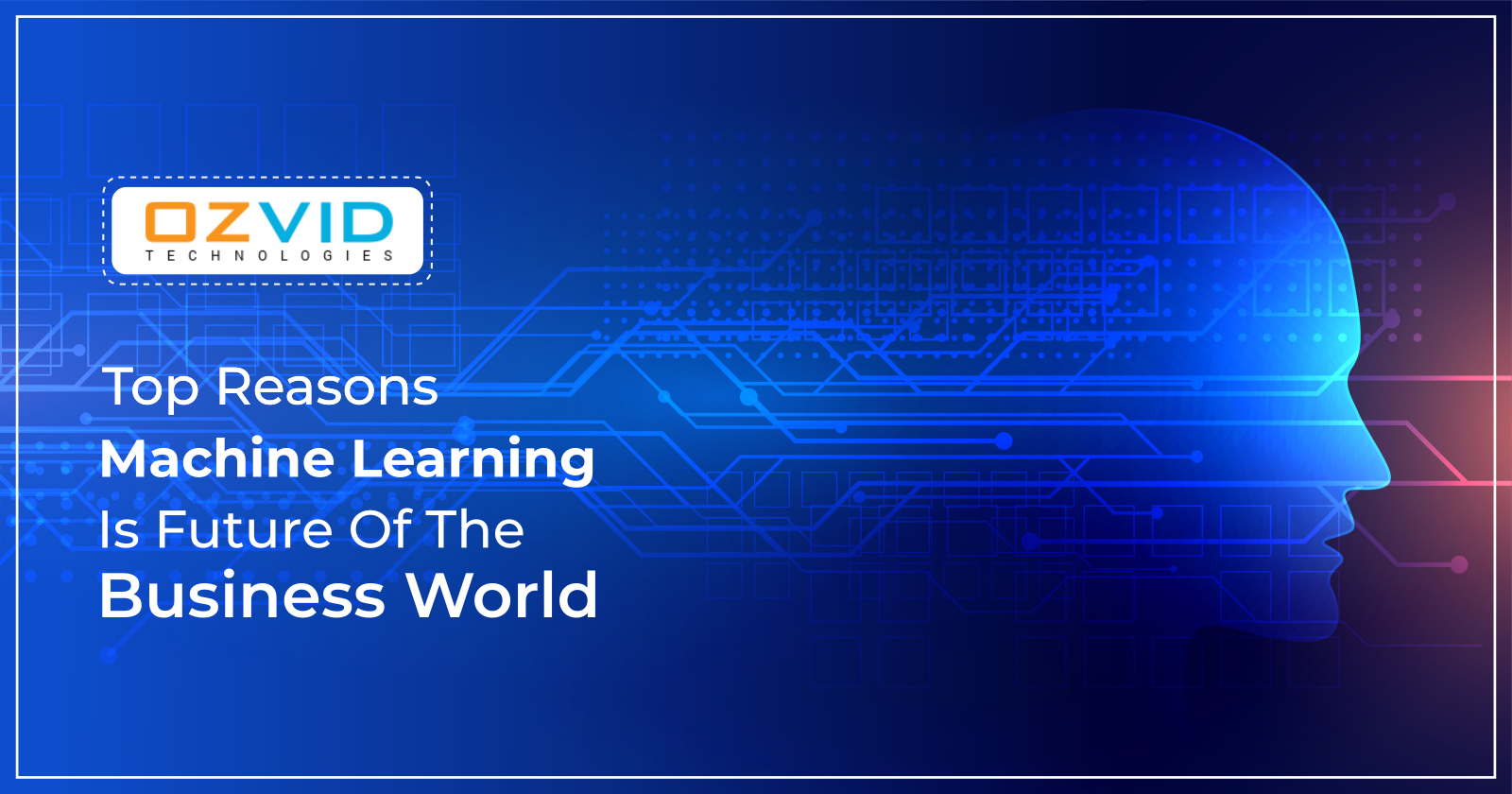- Jul 18, 2025
Share this post on:

In the current era of digital transformation, businesses across all industries are rapidly adopting advanced technologies to enhance their operations, improve customer experience, and stay ahead of the competition. Among these technologies, machine learning has emerged as a game-changer that is revolutionizing how companies operate and make decisions. At OZVID Technologies, we firmly believe that machine learning in business is not just a trend—it is the future.
According to some latest machine learning market researches, the total funding earmarked to machine learning universally during the first semester of 2019 is $28.5 billion. Also, the potential global economy that AI could deliver by 2030 is prospected to be $13 trillion.
This blog explores the top reasons why machine learning is shaping the future of the business world, how it empowers organizations, and why now is the right time to integrate machine learning models into your business strategy.
Key Takeaways:
- Machine learning automates repetitive tasks, improving business efficiency.
- It enables data-driven decision-making through predictive analytics.
- Businesses use machine learning to personalize customer experiences.
- Machine learning enhances cybersecurity and fraud detection systems.
- Adopting machine learning offers a strong competitive edge and scalability.
What Is Machine Learning?
Machine learning is a subset of artificial intelligence (AI) that enables computer systems to learn and improve from experience without being explicitly programmed. It involves the use of algorithms that can analyze data, recognize patterns, and make decisions with minimal human intervention. These algorithms are trained on historical data and then used to predict future outcomes or automate complex processes.
In business, machine learning models are used to solve problems that involve classification, prediction, optimization, and decision-making. These models get smarter over time as they are exposed to more data, making them incredibly powerful tools for businesses seeking growth and efficiency.
1. Automating Repetitive Tasks
One of the most immediate benefits of machine learning in business is its ability to automate repetitive and time-consuming tasks. From data entry to inventory management, customer support to payroll processing, businesses are leveraging machine learning models to handle operational processes with minimal human involvement.
This automation not only reduces human errors but also allows employees to focus on more strategic and creative tasks. For example, chatbots powered by machine learning can handle thousands of customer queries simultaneously, delivering instant responses and improving overall service efficiency.
2. Improved Decision-Making with Data-Driven Insights
Businesses today generate massive volumes of data every second—from customer preferences and purchase history to marketing analytics and sales performance. However, turning this raw data into actionable insights can be overwhelming without the right tools.
Machine learning models excel at analyzing large datasets quickly and identifying patterns that humans might miss. With predictive analytics, businesses can make informed decisions based on data trends. Whether it’s forecasting demand, identifying customer churn, or optimizing marketing campaigns, machine learning in business enables smarter, faster, and more accurate decisions.
3. Personalized Customer Experiences
Customers today expect highly personalized experiences tailored to their preferences and behaviors. Machine learning plays a crucial role in meeting this expectation by analyzing user data in real-time and delivering personalized recommendations, offers, and content.
E-commerce platforms, for example, use machine learning models to recommend products based on browsing history and past purchases. Similarly, media streaming platforms personalize playlists or show suggestions using the same technology. This level of customization not only enhances customer satisfaction but also increases engagement and loyalty.
4. Enhanced Cybersecurity and Fraud Detection
Cyber threats and data breaches pose serious risks to modern businesses. Traditional security systems are often reactive and may not catch sophisticated or emerging threats in time. Machine learning changes this by offering proactive threat detection.
By continuously monitoring network traffic and learning from historical attack patterns, machine learning models can identify anomalies and potential threats in real-time. In financial services, for instance, these models can detect unusual transactions and flag them as potential fraud, thus protecting both the business and its customers.
5. Predictive Maintenance in Manufacturing
In industries such as manufacturing, equipment downtime can result in significant losses. Traditional maintenance schedules are often based on usage or time intervals, which can either lead to unnecessary maintenance or unexpected failures.
With machine learning, companies can adopt predictive maintenance strategies. By analyzing data from sensors and historical maintenance logs, machine learning models can predict when a machine is likely to fail and trigger maintenance just in time. This minimizes downtime, extends equipment life, and reduces maintenance costs.
6. Streamlining Supply Chain Management
Supply chain operations involve multiple variables, such as demand forecasting, inventory management, logistics, and supplier coordination. Managing these manually or using outdated tools can be inefficient and error-prone.
Machine learning in business allows for more dynamic and responsive supply chains. Algorithms can forecast demand more accurately, optimize inventory levels, and predict potential disruptions. Real-time tracking and route optimization also enhance logistics efficiency, ensuring faster and more reliable deliveries.
7. Boosting Marketing Effectiveness
Marketing departments are increasingly using machine learning models to enhance campaign performance and target the right audience at the right time. From segmentation to ad targeting and ROI analysis, machine learning simplifies and improves every aspect of digital marketing.
By analyzing customer behavior and engagement metrics, machine learning can predict which messages are most likely to convert and recommend content or promotions accordingly. This leads to higher conversion rates and better allocation of marketing budgets.
8. Human Resource Optimization
HR departments are adopting machine learning to streamline recruitment, performance management, and employee engagement. Algorithms can screen resumes faster, identify top candidates, and even assess cultural fit based on past hiring data.
Furthermore, machine learning models can analyze employee sentiment, detect signs of disengagement, and suggest interventions to improve retention. This not only improves HR efficiency but also enhances the overall employee experience.
9. Product Development and Innovation
Companies are using machine learning in business to drive product innovation by understanding market needs, customer preferences, and emerging trends. It helps in identifying gaps in existing products, optimizing product features, and even suggesting new ideas based on user feedback and competitor analysis.
For example, a tech company might use machine learning to analyze customer reviews and detect recurring complaints or feature requests. This data can guide product teams to prioritize updates that will have the most impact.
10. Scalability and Competitive Advantage
As businesses grow, scalability becomes a major concern. Manual processes and traditional analytics tools often struggle to keep up with growing customer bases, product lines, or operations. Machine learning offers scalable solutions that can handle vast datasets and complex processes efficiently.
Adopting machine learning in business provides a strong competitive edge. Companies that implement these technologies early gain the ability to respond quickly to market changes, offer better products, and deliver superior customer experiences compared to their competitors.
Future Trends in Machine Learning for Business
The adoption of machine learning is accelerating, and future developments will only expand its applications. Key trends to watch include:
Explainable AI (XAI): Helping businesses understand how machine learning models make decisions, enhancing transparency and trust.
AutoML (Automated Machine Learning): Allowing non-experts to build and deploy models easily, democratizing access to machine learning.
Edge ML: Bringing models closer to the data source (e.g., IoT devices), reducing latency and enabling real-time decision-making.
Integration with Blockchain and IoT: Creating secure, intelligent systems that combine data integrity with predictive power.
Final Thoughts
The influence of machine learning in business is undeniable. It is not just a supporting tool but a core driver of transformation, growth, and innovation. From automation and personalization to forecasting and optimization, machine learning models are redefining the rules of the modern business world.
At OZVID Technologies, we are proud to be at the forefront of this revolution. Our dedicated team of data scientists, AI experts, and business strategists work closely with clients to integrate intelligent machine learning solutions tailored to their needs. Whether you're a startup or an enterprise, leveraging machine learning is not a matter of if, but when—and the time is now.
Partner with OZVID Technologies to future-proof your business with smart, scalable, and data-driven solutions powered by cutting-edge machine learning.
FAQ's
1. How can machine learning enhance strategic decision-making in business?
Machine learning enables businesses to analyze vast amounts of data quickly and accurately. It uncovers hidden patterns, forecasts trends, and provides actionable insights that help in making informed and data-driven strategic decisions, reducing the reliance on guesswork or intuition.
2. How do machine learning models improve customer experience?
By analyzing customer behavior and preferences, machine learning models enable businesses to personalize experiences, such as product recommendations or targeted offers. This leads to higher satisfaction, better retention, and stronger customer loyalty in competitive marketplaces.
3. What industries are most impacted by machine learning in business today?
Industries like finance, healthcare, retail, manufacturing, and logistics are leading adopters of machine learning. These sectors benefit from predictive analytics, automation, fraud detection, personalized services, and operational efficiency driven by machine learning models and algorithms.
4. Can small businesses benefit from machine learning solutions?
Yes, small businesses can leverage scalable and cost-effective machine learning tools. Cloud platforms and AutoML services make implementation easier, enabling small businesses to use predictive analytics, automate tasks, and personalize marketing without needing extensive in-house expertise.
5. What makes machine learning a sustainable long-term investment for businesses?
Machine learning provides continuous value by learning and improving over time. It adapts to new data, scales with business growth, and drives innovation across departments—making it a future-proof investment that boosts efficiency, profitability, and competitive advantage.










